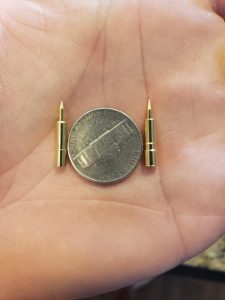We’ve almost forgotten how important the U.S. military has been in the development of massive technological breakthroughs. But its top tech guru hasn’t.
The very thing you’re reading this on likely wouldn’t exist, at least in its current form, without the Pentagon. The development of the Internet got its first funding from the U.S. Department of Defense in the late 1960s.
The Global Position System (GPS) was another DoD dream back in the 1970s. Artificial intelligence even got its start that way.
Yet, for some reason, we have fallen in love with all of these Silicon Valley unicorns of late. I’m not saying they aren’t important in advancing technology. But they don’t have to work alone.
The DoD is reminding the world of this right now.
Public-Private Partnerships on Technology
Michael Kratsios, the acting undersecretary of defense for research and engineering also referred to as the CTO of the US, announced yesterday that he plans on turning U.S. military bases into testing sites for 5G technology.
Using our own military’s operations as trials for 5G will allow the U.S. government its first real opportunity to develop rather than restrict technology.
Up until now, the only word from the federal government on 5G was that companies like Huawei were security threats. Now, the government is taking an active role in building out the technology domestically.
It isn’t, of course, going to go it alone.
Kratsios pointed out that the Pentagon has a long history of working with private businesses to develop new tech. Kratsios should know. He was Peter Thiel’s right-hand man before becoming the tech expert for the Trump Administration.
Bridging the public and private spheres on technology development is exactly the goal. The reasons why seem obvious.
This domestic development is the key element spurring the military along. Kratsios notes, “This is about finding domestic alternatives to Huawei, Nokia, and Ericsson, ones that play to the software strengths of The United States.”
And no matter who takes the White House come inauguration day in January, that sentiment is almost certainly going to carry on.
The military plans to test the 5G technology to operate drones, communicate across the planet, and even perform remote surgeries.

Grab a piece of paper and pen to write this down…
Because you’re about to see the name and ticker symbol of the ONLY 5G STOCK every investor should own.
You can get the name and ticker of this company right here, no strings attached. But you better act fast…
Because the Federal Communications Commission, the government agency in charge of 5G, just scheduled a major announcement that would send shares soaring once announced.
Don't miss out. Click Here to Get #1 5G play for 2020 before the next market close.
Who Wins from This New Government Push?
This could be crucial and have immediate impacts on the domestic businesses actually developing this tech right now. Companies like Verizon and T-Mobile, Qualcomm, and even Apple could start getting contracts to build out these military base sandboxes for the government.
Of course, with this new player into the 5G world, it also changes the game a bit.
Rather than picking just one or two winners, Kratsios added that the Pentagon is looking for “software-driven architecture standards” that are open. Meaning, if these companies want the government’s involvement and money, they will have to leave the new 5G tech open to others to build upon.
This could have a rather dramatic effect on how these companies develop their own 5G infrastructure and the software supporting it.
It’s still early to know how important this new involvement from the Pentagon will be.
But if it turns out to be a partnership like those that created the Internet, GPS, and AI...
Then the windfall from 5G will be bigger than we imagined.
To your prosperity,
Joshua M. Belanger
Executive Publisher & Founder